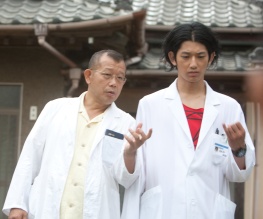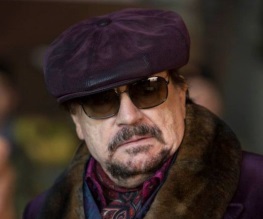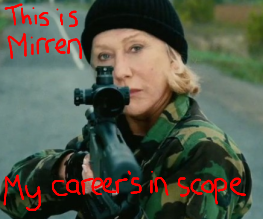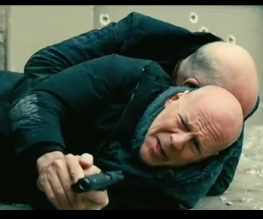Dear Doctor

Japanese cinema and I have a somewhat uneasy relationship. It loves me – I assume – and I try to love it, but sometimes its mellow and unhurried rhythms just can’t compete with Hollywood’s endless parade of punch-sex-gun-sex-kick-sex-EXPLODING TRACTOR-type films. Seeing Dear Doctor the morning after suffering through absurd bangBangBANG-fest Red, I hardly felt in the mood for a film which I knew was bound to be slow, dignified and much more intelligent than I was in the mood for. Dear Doctor was certainly all of these things, but somewhere in the gaps between its stylised dialogue and endless bloody tracking shots of motorcycles is hiding a very interesting and well-made film.
As you may have just found out, the above trailer appears to be subtitled in a mysterious Asian tongue. This is not our fault; watch it anyway, it’s pretty and you can spot the doctors by their white coats. OR CAN YOU?
Soma (Eita), a rich-kid medical student from the big city, is horrified when he is instructed to spend his summer interning in a tiny, one-doctor village clinic. However, he finds he’s overdue a helping of humble sushi (that’s culturally specific, not racist) when he meets charismatic and selfless local doctor Ino (Tsurube). Ino’s encyclopedic knowledge of his patients’ ailments and endearing use of old-fashioned remedies along modern drugs have made him into a local hero, and Soma becomes determined to learn as much as he can from this unconventional miracle worker. BUT! All this is sneaky spoiler territory from after the opening credits – the first thing we discover about Ino is that he’s upped sticks and disappeared, without even taking his snazzy white coat. Why? What on earth is going on?
Experienced nurse Ohtake (Kimiko) is sure something fishy’s going on, but her devotion to Ino prevents her from saying anything until his disappearance. And gentle widow Ritsuko (Yachigusa) doesn’t seem to be getting any better despite the medicine she’s been prescribed for her ulcers. When her daughter, a Tokyo doctor (Haruka Igawa) returns to the village for a visit, the entire story begins to unravel and the village finally learns who their dear doctor really was.

Ingeniously presented in two simultaneous timeframes, Dear Doctor is initially a bit of a challenge for the faculties – there are no visual cues to suggest which scenes occur before the doctor’s disappearance and which come after, so relaxing and enjoying the uniformly beautiful shots is not an option although it’s certainly tempting. Director Miwa Nishikawa takes full advantage of the lush and gleaming countryside which surrounds his geriatric-fairytale village, and there is certainly plenty to look at.
Every main character can be readily empathised with, and the audience is encouraged to immerse itself in each point of view – the conflicted doctor backed into a corner, the patients dependent on their only source of expertise, even the pharmacist’s salesman who knows there is more to his job than securing a sale. Well-crafted and impeccably-translated dialogue helps this along, as do several superb performances from actors I will certainly be looking out for again – Kaori Yachigusa’s quietly suffering pensioner is a particularly finely judged turn which exhibits the deference partially lacking in Eita’s brash young doctor.

My most severe criticism is levelled at the soundtrack, which is constructed almost entirely of jangling American country music and seems completely at odds with the pastoral visual cues of the film. However, this is a very minor complaint and one which I would not have bothered if I had objected to anything more significant. I didn’t; Dear Doctor is quite superbly constructed and supremely relevant tale dealing with universal issues in a very accessible fashion. Excellent.





Recent Comments